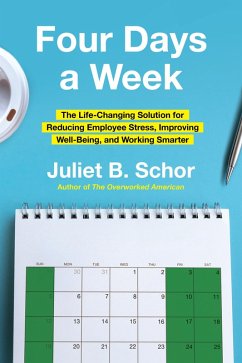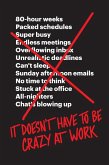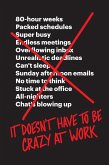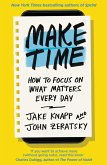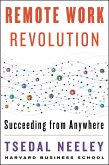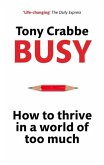Around the world, long hours and intense pressure are taking their toll. When the pandemic hit in 2020, work-induced stress and burnout skyrocketed. Many reached a breaking point. Now, three-quarters of the world's employees are disengaged and struggling, including in the US and Canada, where half are experiencing high levels of daily stress.
Our current work culture, the five-day, forty-hours-a-week modelwhich has gone unchanged for nearly a centuryis failing. But a remedial countertrend has emerged: the four-day work week. Kickstarter, Bolt, Basecamp, ThredUp, and hundreds of other employers have eliminated the fifth day of work, successfully figuring out how to maintain productivity while seeing remarkable improvements in employee well-being. Hiring is easier and fewer people are quitting. These results are global. Working a four-day week, people feel energized, capable, and more optimistic about their livesand their jobs.
Four Days a Week is the first large-scale study of this trend. Juliet Schoran expert who has researched and written about work for more than four decades, beginning with her New York Times bestseller The Overworked American in 1992shares her pioneering analysis of the benefits of a shorter work week, how companies can achieve them, why the concept has taken so long to emerge and gain acceptance, and why doing so will help a company's employees and its bottom line. The book is a blueprint for implementing a change that once seemed radical, but is now within reach.
Dieser Download kann aus rechtlichen Gründen nur mit Rechnungsadresse in A, B, BG, CY, CZ, D, DK, EW, E, FIN, F, GR, HR, H, IRL, I, LT, L, LR, M, NL, PL, P, R, S, SLO, SK ausgeliefert werden.
"A four-day week with a five-day salary? Without lowering productivity? Reducing commute time and carbon emissions? Is this all too good to be true? To find out, Julie Schor and her co-researchers surveyed 8,700 workers in 245 organizations, spanning several continents. In this sequel to The Overworked American and Overspent American, and applying her usual 'out-of-the-box' approach, the brilliant economic sociologist Juliet Schor shows us a better way to live." - Arlie Russell Hochschild, author of Stolen Pride and New York Times bestselling author of Strangers in Their Own Land
"Burnout takes a huge toll both on our personal lives and on our productivity at work. Juliet Schor uses her research to make a powerful evidence-based case for the four-day work week as an antidote to what ails us. This is a book that will inspire CEOs, politicians, and the rest of us to work for change that can genuinely make life better." - Robert J. Waldinger, MD, professor of psychiatry, Harvard Medical School, and director, Harvard Study of Adult Development
"Juliet Schor may be our most important economist, because she works on the things that actually matter to most of us, like why we can't have enough time to lead the lives we want. And as this book makes-anecdotally but also empirically-clear, we can! There's nothing pie in the sky about her plans-it's just pie!" - Bill McKibben, bestselling author of Deep Economy
"Conversations about the future of work are laden with hot takes and biased perspectives. Four Days a Week is not that. It's a book that is well-researched, well-told, and well-timed. Conventions around how, when, and why we work were negotiated before and can be negotiated again. We are on the precipice of fundamentally rethinking how we work, and Four Days a Week is the manifesto that will usher us into this new age." - Simone Stolzoff, author of The Good Enough Job
"It's an open secret of 21st century life: lots of workplaces throw hours at problems instead of respecting people's time. Even in tightly-run places, the turnover that comes from burnout can keep teams from achieving their best. In this thought-provoking and meticulously researched book, Schor shares how some companies have seen success by moving to a four-day week. Employees and organizations can benefit when people work hard while at work-and then get real time off. No matter where you come down on debates about workplace policies or labor laws, you'll find this book eye-opening. I know I did." - Laura Vanderkam, author of 168 Hours and I Know How She Does It
"In her important and hopeful new book, Four Days a Week, Schor shares her new research, case studies and practical steps to show how shorter work hours can be life changing, improving human wellbeing as well as organizational productivity. More, drawing deep from history, she argues that long work hours are not inevitable, necessary, nor a cultural phenomenon, but the result of choices. And, it's time we made wiser ones. The future of work, our health, and that of our democracies, societies, economies, and planet may well depend on it." - Brigid Schulte, award-winning journalist and New York Times bestselling author of Overwhelmed
"Juliet Schor has written a powerful, persuasive case for the four-day work week. Easily readable and backed by evidence and comprehensive data, Four Days a Week shows how a shorter work week has the potential to benefit workers, companies, and society at large." - Adia Harvey Wingfield, PhD, bestselling author of Gray Areas: How the Way We Work Perpetuates Racism and What We Can Do to Fix It
"This book challenges the status quo for how we think about the 'traditional' work week by presenting the 'four day' work week as an innovative option. Grounded in theory, data, and case studies, we learn from this book that when done right, the four day work week results in not only wellbeing and productivity, but it also has positive consequences for our planet. Thus, this book is a must-read for leaders who desire to use the design of work as a vehicle for creating a better world." - Lynn Perry Wooten, President of Simmons University and Wall Street Journal bestselling co-author of Arrive and Thrive: 7 Impactful Practices for Women Navigating Leadership
"[Schor's] robust research offers proof of concept across a range of organizations, and the case studies provide a shrewd road map of the different routes a company might take to a four-day work week. Employers looking to stand out in a tight labor market should start here." - Publishers Weekly

